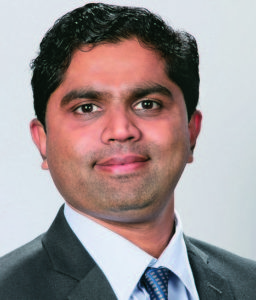SBI General Insurance Co is making its presence felt in the general insurance space, says Rikhil Shah, its CFO. He also mentions that the strengths of SBI Group’s reach, brand is a major advantage:
Mohan: Can you give a general overview of the performance of SBI General Insurance in 2016-17? What has been the total new business premium in the year? What are the growth figures?

Rikhil Shah
Rikhil Shah: We are one of the youngest players in the industry to have recorded a profit in our books. For the year 2017-18, we have secured profits to the tune of Rs 359 crore YTD December 2018 and our GWP in the same period stands at Rs2520 crore.
Cost optimization and initiatives towards cost control have led to a reduction in our operating expenses. A business mix with comparatively lower reliance on motor and higher concentration in retail – fire (LTH), PA and health – has helped us to generate profit. We are looking at multiple avenues to make all our products accessible to customers.
We intend to achieve a sustained profitable growth of about 30% – 40% this year. We want to increase our presence in untapped areas through multi-channels. Currently, we service 55% of our customers through the State Bank Group’s 23000 branches spread across the country, in addition to our own 110+ branches. We are also present in over 350 locations through satellite resources – an extensive network of trained SPs, agents and brokers.
Do you envisage any major changes that could happen in the general insurance industry in the immediate future? How is SBI General Insurance prepared?
India is generally not too risk conscious. But, this convention is gradually changing. One of the first areas where it took shape was in motor third party. It is now expanding to the protection of property. I believe that the scope of liability insurance will expand both at the retail level and, of course, for companies. Another development in the industry is artificial intelligence and its implications. Today, there are policies available with loss of profit, yet if in the future, there happens to be a software malfunction, it can create issues of accountability. The company using the robots is not the one that manufactured them. Hence, the question of who is to be held responsible is brought up. These legal guidelines too have to emerge with case laws. Companies may not have people but robots to insure. Here, the damage is not of bodily harm to the workers but that of financial loss, through loss of production. It will remain an insurable risk.
On another note, with respect to the Union Budget 2018, with the announcement of the National Health Protection Scheme initiative which will benefit 10 crore families with up to Rs 5 lakh benefits per year, the government has made some serious efforts to improve the state of healthcare in the country and made it a prime focus. Further, raising the limit for health insurance premium from Rs 30,000 to Rs 50,000 under section 80 D of the Income Tax Act and allowing a deduction of Rs 1 lakh for critical illness for senior citizens will prompt a shift in the mindset of consumers who still think that they do not require insurance and encourage them to review their decision.
One of the expectations is for insurance companies to spread out to hitherto unexplored areas in rural India. What sort of investment would be required for this purpose?
Insurance penetration is low in our country owing to lack of awareness and inaccessibility to insurance products. As far as our reach is concerned, we have the biggest distribution partner – the State Bank Group – across the geography. We have been able to penetrate in the rural market with simple products. In Tier 2 and Tier 3 markets, our Simple Health Policy and Individual Personal Accident Insurance Policy are the highest selling products. We shall continue to leverage the far-reaching distribution potential to offer simple insurance solutions best suited to such profile of customers.
What are the unique products that SBI General Insurance has on offer?
One of our offers, the Simple Home Insurance Policy, is a package providing coverage for a term period of up to three years. The policy offers a wholesome package for your home, comprising 10 different sections that are covered for, including public liability, personal accident, breakdown of domestic electric & electronic appliances and loss of cash whilst in transit, among others. It is a policy that can be availed for owned as well as rented properties. Since this policy is available on a First Loss Basis, a customer can choose a suitable cover without incurring extra cost. Additionally, the policy covers not just the property but also its contents and comes with a unique feature to cover apartments on agreed value basis as against reconstruction cost.
We also offer an Arogya policy – a series of health insurance policies catering to different needs. Under the Arogya policy umbrella, we have three policies – Arogya top-up, Arogya Plus and Arogya Premier. The Arogya top-up policy allows one to add extra protection at low premium so one can smoothly overcome the rising medical costs over and above the pre-decided medical cost. Arogya Plus is a policy that provides protection against rising OPD medical expenses and hospitalization expenses. Arogya Premier Policy is exclusively designed to meet special healthcare requirements of individuals of high net-worth. With a wider medical coverage offer by this policy, HNIs can avail the best medical treatment from top medical experts.
And our Loan Insurance Policy offers cover for critical illness, personal accident and loss of employment.
Can you talk about the distribution channel? Do you rely more on agents?
We have 111 dedicated branches. We also have a vast footprint through 20,000 SPs, over 8,500 agents and 300 plus brokers and are constantly looking to expand all such channels. Currently, we service 55% of our customers through the State Bank Group’s branches, in addition to our own branches. We are also present in over 350 locations through satellite resources- an extensive network of trained SPs, agents, and brokers. We are also looking to increase our employee base by 20%.
Do you think insurance industry in general is lagging in adopting digitization? What are the major digitization efforts in SBI General Insurance?
The insurance industry is constantly looking into disruptive technology for improving operations and customer experience. It may seem like the industry is lagging in the adoption of digitization since some technologies, like telematics, are still in the early stages of discussion and debate. But, on the other hand, there are technologies which have been adopted well and have changed the industry in many ways. One of them is cognitive services. In its current state, it can find a wide range of applications, but we mostly see it in play in the form of chatbots. While this is only the tip of the iceberg, there are many such offerings waiting to be explored in the cognitive services space. Moreover, the government of India has started using Remote Sensing Technology (RST), satellite data and drone-based images for CCE planning and mapping risks by districts. The actuarial premium rates will be rationalized, resulting in affordable premium rates for farmers. Timely settlement of claims will become a reality due to availability of data on real-time yields.
Can you give details of the technology platform the company has and its uniqueness?
SBI General has been keeping a close eye on the trends in the industry, working towards creating streamlined insurance operations with the help of emerging technologies. In the case of blockchain, we aim to use it to integrate with the existing infrastructure to reduce turnaround time as well as the resources utilized. It validates the data using a feature called Smart Contracts and customers get their claims through an entirely automated process.
Having implemented cloud technology, we are aiming to see a change in various claims processes such as net promoter score and in-house investigations. The cloud offers inherent benefits such as state-of-the-art security features, ease of application, and reduced processing and infrastructure cost. We are working closely with OEM partners to automate claims processes and provide seamless services to our customers. A number of our employees do not work out of an office and with the help of cloud, we are able to create a shared infrastructure that can be accessed anywhere, which helps reduce turnaround time, thereby enhancing customer experience.
Can you talk about the recent HR initiatives in the company? How do you spot talent and nourish it?
We are in the process of undertaking some major upgrades both on the business front as well as the people front. We are reviewing all our existing people processes and policies to make them more business-enabling. We are also embarking on a comprehensive digitization drive and this would include our people initiatives as well. We are looking to use technology-enabled solutions to better our recruitment, talent management and employee engagement areas. With the geographic spread that we cater to, leaning on technology is becoming imperative rather than a choice.
We are looking to identify young talent and train them on insurance and our internal processes, thus diversifying our talent-sourcing pool. We are also identifying resources internally for positions opening up in middle and senior management rather than only filling them through external options. We believe skill enhancement and career growth options are the best way to nourish talent and in order to achieve this we have regular training sessions both through classroom interventions and online courses. Our internal job postings are usually well received with a substantial number of openings getting closed internally.
What advantages SBI General Insurance has derived from being an associate of the State Bank of India?
As I said, the State Bank Group has a strong branch network and as such bancassurance comprises 55% of our distribution network. Apart from that, currently, the brand is present through trained SPs which are around 20,000 in number. We are one of the few brands to have a substantial presence in the North East. This network allows us to reach out to the masses with simple, easy to understand insurance covers which can be readily serviced as well.
Finally, do you think there is scope for consolidation in the Indian insurance sector?
Consolidation emerges from the desire to be large scale and have the ability to address different clientele and have better synergy in expenses, leading to higher value for customers and shareholders.
The Union Budget 2018 announced the merger of the three general insurance PSUs (United India Insurance, New India Assurance, and Oriental Insurance) into a single entity. This entity will subsequently be listed, thus providing the necessary push for insurance penetration in India. The merged entity and its subsequent listing could lead to improved operational efficiencies, adoption of suitable risk-based pricing model while looking at a sustained growth rate, positively impacting both the insurance sector and the customer in the long term. Furthermore, this would encourage domestic and foreign investors to positively review their investment decision in the sector.
The insurance sector in India is growing rapidly and it is safe to say that consolidation is inevitable.







